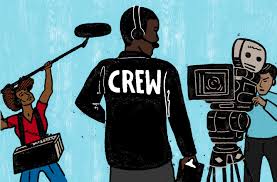Studying film production provides you with the technical, creative and business skills needed to work in the film and wider creative industries
Job options
Jobs directly related to your degree include:
- Film director
- Film/video editor
- Lighting technician, broadcasting/film/video
- Location manager
- Media researcher
- Music producer
- Runner, broadcasting/film/video
- Sound technician, broadcasting/film/video
- Television/film/video producer
Jobs where your degree would be useful include:
- Broadcast engineer
- Broadcast journalist
- Photographer
- Sound engineer
- Special effects technician
- Television camera operator
- Television floor manager
- Television production coordinator
- VFX artist
Work experience
Starting your career in film production can be challenging as there's strong competition for roles. Work experience is essential for building your CV and portfolio/showreel, as well as increasing your networking opportunities. Working as a runner, supporting production staff on film sets, is a good way to learn about the production process and gain valuable contacts in the industry.
Make use of the projects you take on at university to build up a portfolio of work. There may be opportunities for work experience or field trips both in the UK and overseas as part of your degree course. You could also help out at local film festivals.
Showcase your work to industry professionals at every opportunity, for example at competitions and festivals. Make the most of all opportunities to network and develop your contacts
Typical employers
Job opportunities are available with film and television production companies, as well as with online broadcasting companies.
There are also opportunities within the broader creatives industries, as well as other sectors. Typical employers include:
- advertising, PR and other creative companies
- charities
- corporate business
- marketing companies
- universities.
Opportunities may be advertised on industry websites, company websites, in trade magazines or with recruitment agencies. The professional contacts you make through work experience and study can also be a source of opportunities.
Many graduates work on a freelance basis, working on a range of short-term projects. You can also set up your own company. You'll need to be proactive in looking for opportunities and build up a network of contacts. Be prepared to continue your learning in order to keep up to date with technological developments and secure work.
Skills for your CV
Studying film production provides you with a mix of the technical, production, creative and business skills needed to work in the film industry. Film production courses include a mix of practice and theory that allow you to develop knowledge in areas such as:
- cinematography
- directing
- editing
- producing
- screen/script writing
- sound.
You also develop many other skills that are useful in the wider creative arts industries. These skills include:
- team work and collaboration
- project management
- the ability to organise your time, resources and people
- flexibility and willingness to adapt
- communication and interpersonal
- quick thinking and the ability to take direction
- working to a brief, to deadline and within a budget
- reflecting on, and evaluating, yours and others' work
- being proactive and having initiative.








